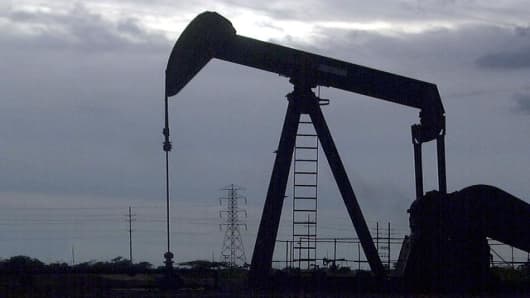Crude prices soared earlier in the day after news reports quoted Israeli Deputy Prime Minister Shaul Mofaz as saying that Iran's nuclear program was poised to make a "major breakthrough" and that his country must be "prepared for every option." Mofaz, a hawkish former defense minister and military chief, is a top contender to succeed Prime Minister Ehud Olmert, who announced Wednesday he will resign in September amid a corruption probe.
Mofaz's comments "got everybody excited to buy oil again" on worries that a possible military strike against Iran would plunge the Middle East into another crisis and threaten regional oil supplies, said Phil Flynn, analyst at Alaron Trading in Chicago.
"That caused the oil market to pop," Flynn said. "It's putting the focus back on Iran."
U.S. Light, sweet crude jumped as high as $128.60 a barrel on the New York Mercantile Exchange, its highest level in nine sessions, before easing back later to settle at $125.10, up $1.02. London crude rose 62 cents at $124.60 a barrel on the ICE Futures exchange.
Prices fell $2.69 on Thursday, and are still down 15 percent from the contract's record high above $147 reached last month.
Oil was also getting a boost as stocks retreated on news that jobs fell for the seventh straight month and that General Motors had its third-worst quarterly loss ever.
U.S. government data showed employers cut 51,000 jobs in July against an expected loss of 72,000 -- but the July unemployment rate rose to 5.7 percent from 5.5 percent in June, a five-year peak and slightly higher than forecast.
In addition, the Institute for Supply Management said its manufacturing index fell slightly from June's reading, but came in better than economists expected.
Crude sold off Thursday after the Commerce Department said the country's gross domestic product rose just 1.9 percent in the second quarter despite government tax rebates, and the Labor Department said the number of people seeking jobless benefits rose to the highest level in five years.
The disappointing data reaffirmed beliefs that a U.S. economic slowdown will further erode demand for oil products in the world's thirstiest energy consumer. Nymex oil prices have dropped off around $24 a barrel since reaching a record high of $147.27 on July 11.
"Prices will likely correct over the next six months to the $100 to $110 range," said Tetsu Emori, commodities markets fund manager at ASTMAX Futures in Tokyo. "There aren't enough fundamental factors right now pushing prices higher."
Worries about Iran's nuclear ambition have weighed heavily on markets in recent weeks and will likely influence trading next week.A deadline expires Saturday for Tehran to show it will stop expanding its uranium enrichment program, at least temporarily, or face the threat of new U.N. sanctions.
Earlier this week, Iranian officials, including supreme leader Ayatollah Ali Khamenei, pledged to continue the country's nuclear program.
In other Nymex trading, heating oil futures fell about a penny to $3.4505 a gallon while gasoline futures added 2.81 cents to $3.099.
Natural gas futures added 24.9 cents to $9.368 per 1,000 cubic feet.


